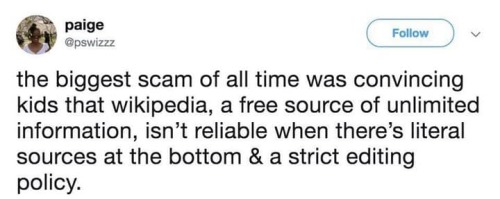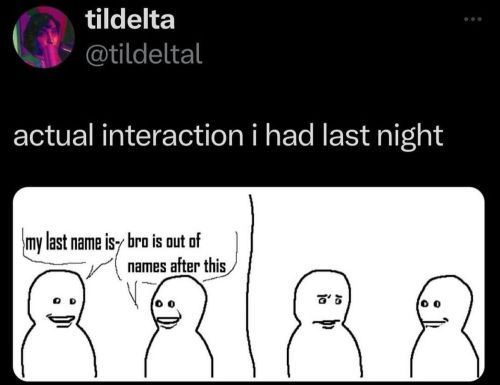I'm A Big Fan Of Tv Shows Where They Do An Episode From The POV Of A Side Character And They're Living
i'm a big fan of tv shows where they do an episode from the POV of a side character and they're living in a completely different genre than the main character
More Posts from Mysticslumber and Others
All useful things turn to shit when you privatize them.
thinking about how I've seen OCD get talked about now, but haven't really seen many posts that actually explain what it is. And like, obviously people shouldn't get all their info about mental conditions from posts, but u can't deny that internet communities and stuff play a major role in people recognizing and putting names to their own experiences.
But like since the general public has like absolutely no idea of what OCD actually is (no thanks to popular media), and a lot of things I see talking about intrusive thoughts don't mention OCD (either bc they originated in OCD circles or bc intrusive thoughts aren't Exclusive to OCD or for some other reason), there should prob be more explanation put out on what OCD actually consists of.
Which is kinda hard in some ways, bc there are so many ways OCD can present in terms of what "themes" a person experiences, so someone talking about what their themes are might not ring a bell with someone who experiences different ones. But like, the core thing with OCD isn't the presence of certain themes, it's a specific pattern of spiraling thoughts and reactions.
Like. OCD is a mental condition/illness where people experience stressful, unwanted, repetitive thoughts. These are intrusive thoughts are what make up the "obsessions" part of the disorder. In response to these intrusive thoughts, a lot of people will perform certain actions or think certain things in an attempt to neutralize or disprove the threat they represent. These are the "compulsions" part of the condition.
For a more "traditional" example, someone experiencing intrusive thoughts that they might catch a communicable disease may obsessively wash their hands or google their symptoms to try to lessen the anxiety. While someone who is worried they might hurt someone (even though they very much do not want to hurt someone) may avoid being near sharp objects or may avoid the people they're afraid of hurting.
One of the issues with OCD is that performing the compulsions provides short term relief, but in the long term it only strengthens the stress caused by the intrusive thoughts, thus furthering the thought spiral and actively making it worse, to the point where, depending on your themes, you may be (almost) convinced that your intrusive thoughts represent the truth or the inevitable or something permanent.
Intrusive thought themes cam be literally anything, but some of the common ones are stuff like
Questioning your sexuality, gender, etc (what if I'm actually straight/gay/bi/trans/cis/etc?)
Being worried about losing control and hurting yourself or others physically, sexually, emotionally, basically any way (what if I want to kill someone? What if I'm a pedophile? What if I'm an abuser? What if I want to stab myself? Etc)
Fear of becoming or being sick
Worrying something bad will happen to you or people you care about
Worrying about your spiritual beliefs or lack thereof (what if I'm actually Christian? What if I'm actually atheist? What if i don't believe in the faith i ascribe to? Etc)
Worrying about relationship status (what if I don't actually love them? What if they're not "the one"? What if they're cheating? What if *I'm* cheating? Etc)
What if I'm a bad person?
Fear of losing things
Fear of things not feeling right (this is often be related to other themes via magical thinking. ex: if I don't have my things organized Just Right then something bad will happen)
Fear of unreality
Compulsions vary by theme a lot obviously, but some common ones include
Hand washing
Organizing things until they Feel Right
Checking and double checking and triple checking to make sure you did something correctly
Obsessively reviewing your memories to disprove a thoughtor make sure you don't believe something
Arguing against the thoughts in an attempt to disprove them
Testing your mental reactions to a thought or to certain kinds of content, to show yourself you don't actually believe or feel something
Obsessively googling symptoms, testimonies, things related to your thoughts
Obsessive prayer
Repeating phrases, mantras, affirmations, etc in an attempt to make thoughts go away
Avoiding things and situations that set off your intrusive thoughts
Repeatedly asking for reassurance from others ("I'm not being xyz, right?")
But yeah this obviously isn't exhaustive but, just, if this kind of thing sounds familiar, you should probably do some research on OCD, bc while intrusive thoughts can occur with other conditions, the intrusive thought-compulsion spiral is the core of OCD and isn't really a subaspect of depression/anxiety/ptsd/etc. and the treatment and management of OCD can look different from other stuff, so its a good thing to look into.
(Also it's important to keep in mind, esp if you're someone that doesn't have it, that someone's intrusive thoughts Are Not "secret desires" or "repressed urges" or anything the person even remotely wants to act on. Someone having harm-related intrusive thoughts is not at risk of actually acting on them, no matter how worried they are of doing so.)
Anyway this was a long post and I don't have a neat way to wrap it up and also I accidentally added a poll and now can't get rid of it so here's free poll. I'm running on nyquil and a small amount of straight gin (which works very well at numbing a sore throat) rn gnite
And if you use on phone.....AHHHHHHHHH, meme never felt so relatable to me

tis the season to remember Medjed aka The Smiter, an invisible egyptian deity with laser eyes and nonbinary swagger:



rotating them gently in my mind as they do a spiffy little dance number


yep

If you see him
It's already too late

guy i saw on train today
Ahahahahah, stupid humor.....frkn love it✨️🍋

Writing Tips
Punctuating Dialogue
✧
➸ “This is a sentence.”
➸ “This is a sentence with a dialogue tag at the end,” she said.
➸ “This,” he said, “is a sentence split by a dialogue tag.”
➸ “This is a sentence,” she said. “This is a new sentence. New sentences are capitalized.”
➸ “This is a sentence followed by an action.” He stood. “They are separate sentences because he did not speak by standing.”
➸ She said, “Use a comma to introduce dialogue. The quote is capitalized when the dialogue tag is at the beginning.”
➸ “Use a comma when a dialogue tag follows a quote,” he said.
“Unless there is a question mark?” she asked.
“Or an exclamation point!” he answered. “The dialogue tag still remains uncapitalized because it’s not truly the end of the sentence.”
➸ “Periods and commas should be inside closing quotations.”
➸ “Hey!” she shouted, “Sometimes exclamation points are inside quotations.”
However, if it’s not dialogue exclamation points can also be “outside”!
➸ “Does this apply to question marks too?” he asked.
If it’s not dialogue, can question marks be “outside”? (Yes, they can.)
➸ “This applies to dashes too. Inside quotations dashes typically express—“
“Interruption” — but there are situations dashes may be outside.
➸ “You’ll notice that exclamation marks, question marks, and dashes do not have a comma after them. Ellipses don’t have a comma after them either…” she said.
➸ “My teacher said, ‘Use single quotation marks when quoting within dialogue.’”
➸ “Use paragraph breaks to indicate a new speaker,” he said.
“The readers will know it’s someone else speaking.”
➸ “If it’s the same speaker but different paragraph, keep the closing quotation off.
“This shows it’s the same character continuing to speak.”
-
 thepiratefish reblogged this · 2 weeks ago
thepiratefish reblogged this · 2 weeks ago -
 thepiratefish liked this · 2 weeks ago
thepiratefish liked this · 2 weeks ago -
 oorevitcejda reblogged this · 2 weeks ago
oorevitcejda reblogged this · 2 weeks ago -
 myfavouriteadventure liked this · 2 weeks ago
myfavouriteadventure liked this · 2 weeks ago -
 celestial-solstice liked this · 2 weeks ago
celestial-solstice liked this · 2 weeks ago -
 ben10nerd liked this · 2 weeks ago
ben10nerd liked this · 2 weeks ago -
 cdarklock reblogged this · 2 weeks ago
cdarklock reblogged this · 2 weeks ago -
 cdarklock liked this · 2 weeks ago
cdarklock liked this · 2 weeks ago -
 midnight-loki reblogged this · 2 weeks ago
midnight-loki reblogged this · 2 weeks ago -
 midnight-loki liked this · 2 weeks ago
midnight-loki liked this · 2 weeks ago -
 bishreksual reblogged this · 2 weeks ago
bishreksual reblogged this · 2 weeks ago -
 theislandluv reblogged this · 2 weeks ago
theislandluv reblogged this · 2 weeks ago -
 sophoklesworld reblogged this · 2 weeks ago
sophoklesworld reblogged this · 2 weeks ago -
 petrichorinmyveins reblogged this · 2 weeks ago
petrichorinmyveins reblogged this · 2 weeks ago -
 limegreenjaden liked this · 2 weeks ago
limegreenjaden liked this · 2 weeks ago -
 jadzialana liked this · 2 weeks ago
jadzialana liked this · 2 weeks ago -
 o0anapher0o reblogged this · 2 weeks ago
o0anapher0o reblogged this · 2 weeks ago -
 ansixilus liked this · 2 weeks ago
ansixilus liked this · 2 weeks ago -
 punkassdebauchery liked this · 2 weeks ago
punkassdebauchery liked this · 2 weeks ago -
 theopenbook-baringoursouls liked this · 2 weeks ago
theopenbook-baringoursouls liked this · 2 weeks ago -
 hero529 reblogged this · 2 weeks ago
hero529 reblogged this · 2 weeks ago -
 hero529 liked this · 2 weeks ago
hero529 liked this · 2 weeks ago -
 bjugnakraekir liked this · 2 weeks ago
bjugnakraekir liked this · 2 weeks ago -
 phthalomoon reblogged this · 2 weeks ago
phthalomoon reblogged this · 2 weeks ago -
 smolbluegoblin liked this · 2 weeks ago
smolbluegoblin liked this · 2 weeks ago -
 wolfinweb reblogged this · 2 weeks ago
wolfinweb reblogged this · 2 weeks ago -
 wolfinweb liked this · 2 weeks ago
wolfinweb liked this · 2 weeks ago -
 swordfisherking reblogged this · 2 weeks ago
swordfisherking reblogged this · 2 weeks ago -
 galadriel1010 reblogged this · 2 weeks ago
galadriel1010 reblogged this · 2 weeks ago -
 tretaaysel reblogged this · 2 weeks ago
tretaaysel reblogged this · 2 weeks ago -
 daysandfiber reblogged this · 2 weeks ago
daysandfiber reblogged this · 2 weeks ago -
 batnoob liked this · 2 weeks ago
batnoob liked this · 2 weeks ago -
 wizardstardust liked this · 2 weeks ago
wizardstardust liked this · 2 weeks ago -
 miliamin1 reblogged this · 2 weeks ago
miliamin1 reblogged this · 2 weeks ago -
 miliamin1 liked this · 2 weeks ago
miliamin1 liked this · 2 weeks ago -
 pancake-clouds reblogged this · 2 weeks ago
pancake-clouds reblogged this · 2 weeks ago -
 rikkitikkitaavi reblogged this · 2 weeks ago
rikkitikkitaavi reblogged this · 2 weeks ago -
 doshwashing reblogged this · 2 weeks ago
doshwashing reblogged this · 2 weeks ago -
 useruzrian liked this · 2 weeks ago
useruzrian liked this · 2 weeks ago -
 vegavegavegavega liked this · 2 weeks ago
vegavegavegavega liked this · 2 weeks ago -
 enchantlost liked this · 2 weeks ago
enchantlost liked this · 2 weeks ago -
 badtzbot reblogged this · 2 weeks ago
badtzbot reblogged this · 2 weeks ago -
 ladyfraser reblogged this · 2 weeks ago
ladyfraser reblogged this · 2 weeks ago -
 ourlordapollo liked this · 2 weeks ago
ourlordapollo liked this · 2 weeks ago -
 eggsbenedictontherocks liked this · 2 weeks ago
eggsbenedictontherocks liked this · 2 weeks ago -
 flowersforbrokenspiritz liked this · 2 weeks ago
flowersforbrokenspiritz liked this · 2 weeks ago -
 indifferentinfatuation liked this · 2 weeks ago
indifferentinfatuation liked this · 2 weeks ago -
 cyberpunkboytoy reblogged this · 2 weeks ago
cyberpunkboytoy reblogged this · 2 weeks ago -
 thefoxwhodraws liked this · 2 weeks ago
thefoxwhodraws liked this · 2 weeks ago
